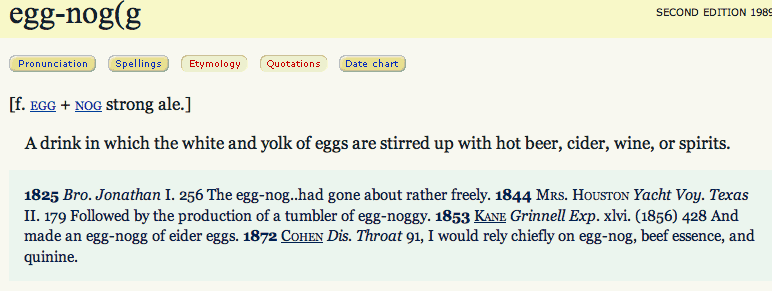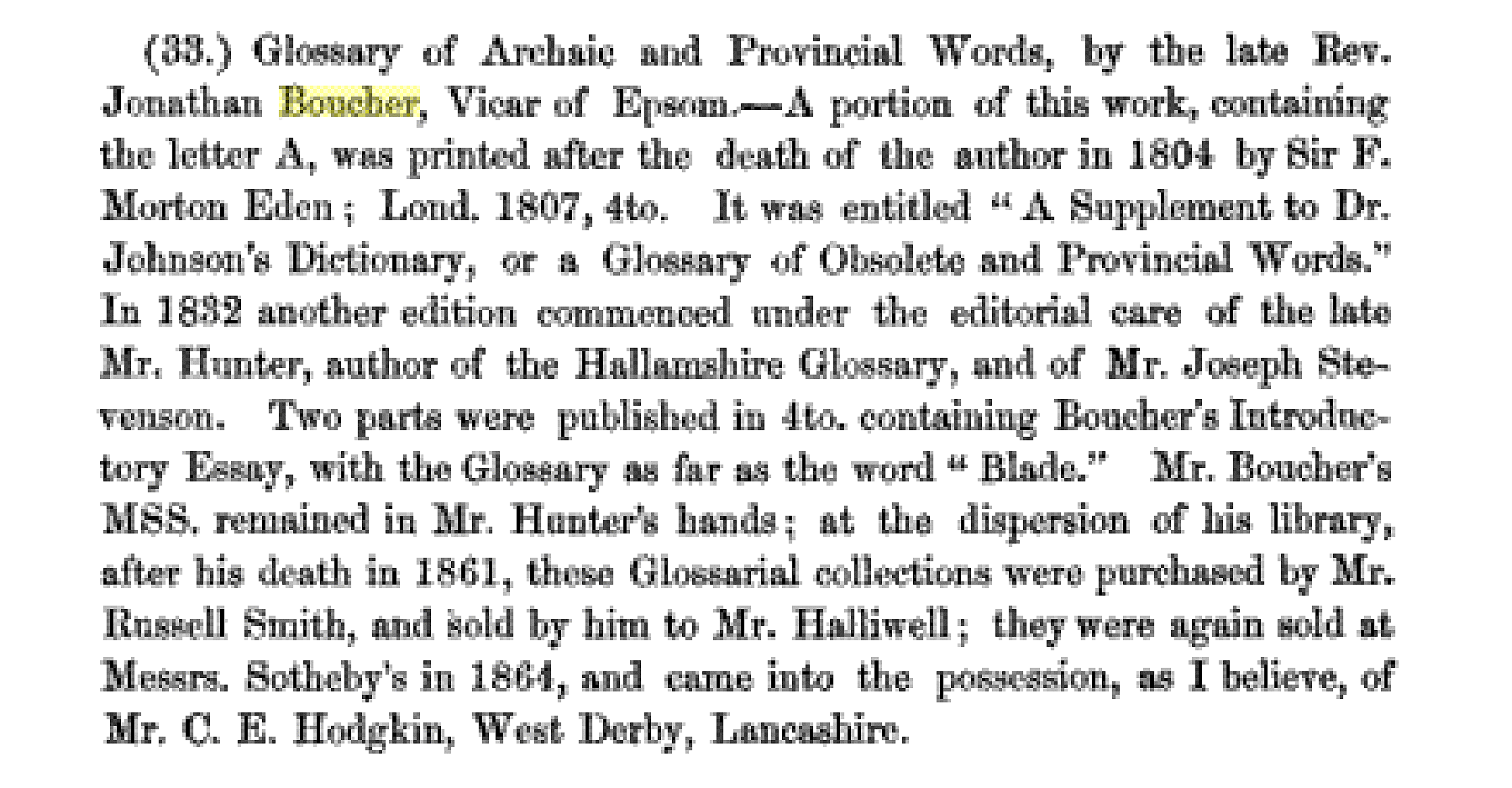Antedated eggnog (Crosspost from LL)
Like Arnold Zwicky, I'm not the kind of linguist who is heavy into antedating and sourcing, but a student and I just recently verified our very own antedation, of eggnog, and it's so seasonal I thought I should share it.
The OED's oldest quote for eggnog is from 1825:

Sara Kraft, an Arizona undergraduate taking a independent study course with me this fall, was reporting to me on a chapter in an anthology of Alan Walker Read's articles on ok.1 Read had occasion to quote from a 'pastoral' poem written around 1774 by 18th-century clergyman and philologist Jonathan Boucher, which quote I happened to notice contained the words 'egg-nogg':
...
Fog-drams i' th’ morn, or (better still) egg-nogg,
At night hot-suppings, and at mid-day, grogg,
My palate can regale:
I don't know why it occurred to me to check in the OED to see what the earliest source they provided was, but I did, and since it was so much later, and from a British source to boot, I got interested. We requested an Inter-Library Loan of Boucher's "A Glossary of Obsolete and Provincial Words; forming a supplement to the dictionaries of the English Language."2 After a false start with an incomplete microfiche from Yale, Harvard obligingly sent us the actual volume. Amazing...
The pastoral poem, quite a long one, is a footnote in the 60-page Introduction to the glossary. The full title of the poem, in the verbose convention of the day is "Absence: A Pastoral: drawn from the life, from the manners, customs and phraseology of planters (or, to speak more pastorally, of the rural swains) inhabiting the Banks of the Potomac, in Maryland".
In the introduction to his Glossary, (p. xlix), Boucher writes the following:
"A List of some of the most remarkable and common [words], collected during my residence in Virginia and Maryland nearly thirty years ago, is here set down at the foot of the page. To this list I will subjoin a copy of verse, which I have ventured to call a Pastoral, written during my residence in America; written solely with the view of introducing as many of such words and idioms of speech, then prevalent and common in Maryland, as I conceived to be dialectical and peculiar to those parts of America."
The italicized terms in the quoted lines above (lines 69-71) are italicized in the original, and are the 'words and idioms of speech' that Boucher considered to be "dialectal and peculiar to those parts of America", including egg-nogg. As Read notes, from his reference to ‘nearly thirty years ago’, we can be sure that the pastoral was written around or before 1774, since Boucher died in 1804. Read notes that he left his Maryland parish in 1775, being a loyalist.
We wrote of our finding to the OED, and received a nice note back from Margot Charlton, saying in part:
I see that the Dictionary of American Regional English has some interesting eighteenth-century evidence for EGG POP, which seems to be similar....The entry goes back to the first edition, and was originally published in 1891; as we revise the text we are finding that we can antedate most entries with the help of the large historical databases now available to us, but it is always
helpful to receive such precise information.
Boucher is a fairly well-documented fellow, having been rector in George Washington's parish, tutor to GW's stepson, and personal friend of GW. A bit of quick googling on eggnog revealed a startling connection between Boucher, Washington, and eggnog: apparently a recipe for eggnog was found among George Washington's "kitchen papers" at Mount Vernon. It doesn't say whether the recipe was titled with the word "egg nog(g)' or not -- the term "egg flip" and (according to DARE) "egg pop" were also in use, or maybe it wasn't titled -- but given that Boucher noticed Marylanders in Washington's parish using it, presumably it's likely that Washington called it that too. Perhaps Boucher even sampled some of Washington's concoction at a holiday party around this time of year in the early 1770s.
1Read was the kind of linguist who is heavy into a/s; I learned a lot from that independent study! If you think the recent rash of abbreviationism is purely technology-driven -- email, texting, all these newfangled electronics driving the kidz of today crrrazy -- you should check out his discussion of the mania for abbreviations in 19th-century New England. Larry Horn describes some of the amazing parallels in detail in this 2002 post to the ADS-L listsev.
2The volume we consulted was indeed titled as above, with "Obsolete" instead of "Archaic", and was from the first (1807) publication of part of Boucher's overall Glossary. It had been bound together by Harvard with another dictionary by Nares, dated 1822. The same piece of Boucher's glossary, up until 'Blade', was published again in 1832, as described in the following excerpt from the "Works of the Camden Society," published by Camden Society (Great Britain), Royal Historical Society (Great Britain) in 1868 (image below from GoogleBooks):
 .
.
Update: The far more sophisticated antedaters and sourcers over at ADS-L have been hot on the trail of 'eggnog' since this post went up! You can follow the discussion by going here and entering 'eggnog' as a search term. The upshot is that a) Sara and I were far from the first to spot that Boucher used 'eggnog' very early on, and b) there are several other instances of the word in published sources from the late 1700s (i.e. whose actual date of publication is earlier than that Boucher publication date of 1807).
So, apologies for wasting everyone's time! but at least it was seasonal. And, as in my independent study, I learned a lot. Happy new year everyone --

7 Comments:
Google Books has another interesting eighteenth-century result: "The American travellers, before they pursued their journey, took a hearty draught each, according to custom, of egg-nog, a mixture mixture composed of new milk, eggs, rum, and sugar, beat up together".
Isaac Weld, Jr. "Travels through the states of North America and the Provinces of Upper and Lower Canada, during the Years 1795, 1796 and 1797", vol. i, London: John Stockdale 1799, page 98. here is the Google Books link.
Some of us curmudgeonly old geezers who use large fonts cannot read screen shots on many forums. Your screen shots on language log are large enough that I can read them. If you can figure out what you did correct please continue to do it and encourage others to do the same.
More from Joel S. Berson here.
hi ho -- Sorry about that 1806 typo there! As you can see from the Camden society bibliographic discussion appended to fn. 2, it should have been 1807. My apologies!
First, congratulations on a nice find. In the age of the digitized text, however, I suspect that a good many of these finds will be short-lived, as well as the 1735 citation here.
Beware of relying on Google Book Search for accurate dating. The title page for that "1735" example reveals the actual year to be 1958.
Hello! Please forgive me if this post is inappropriate, but I couldn’t find a direct email address on your blog. I’m Anton and I’m launching my new blog dealing with language translation issues and would appreciate the opportunity to discuss mutual collaboration. You can contact me if you like at anton [at] icanlocalize {dot} com. Thanks!
Post a Comment
<< Home